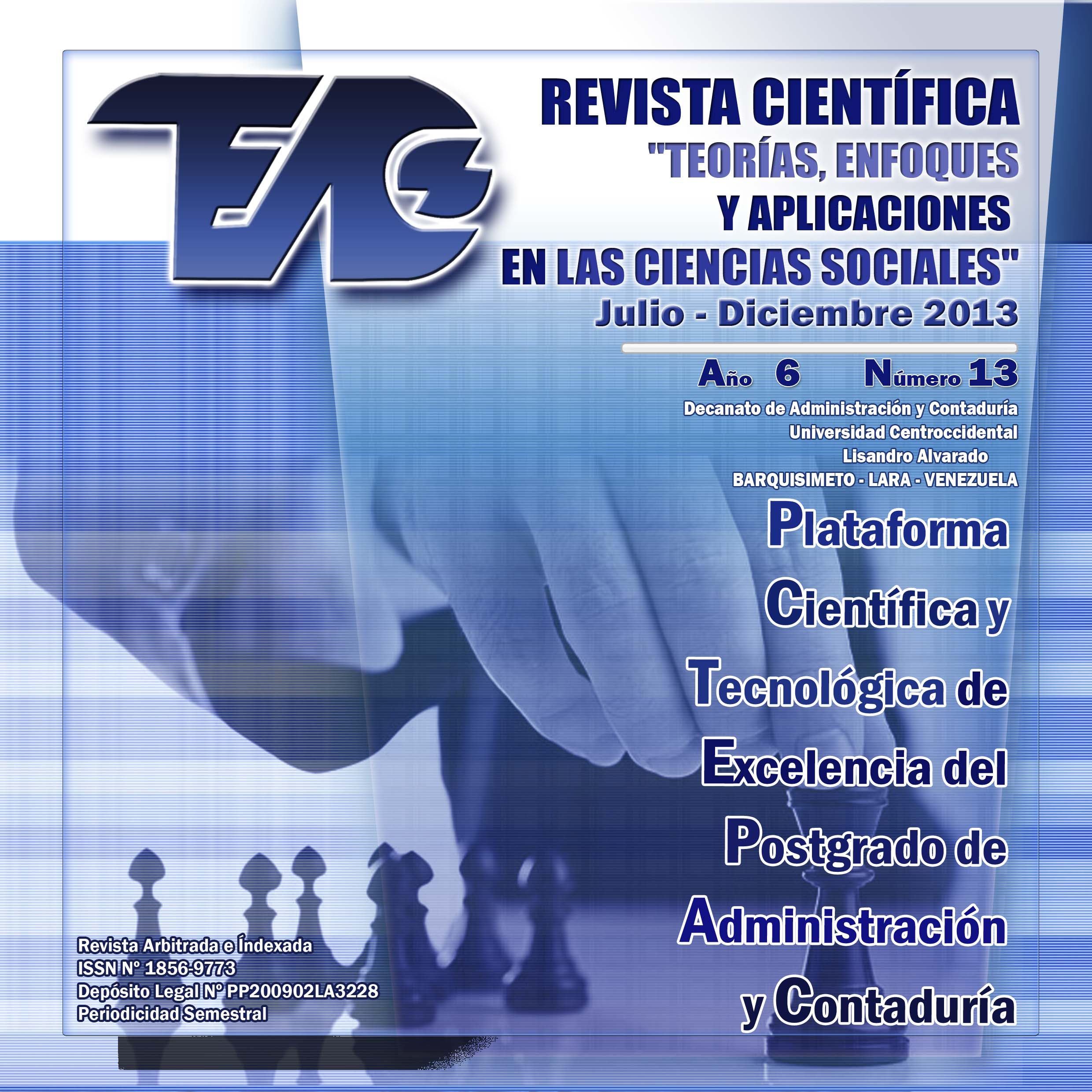The Organizations and based systems thinking and hermeneutics phenomenology
Keywords:
phenomenology, hermeneutics, organizations, systems theoryAbstract
This paper demonstrates the use of the current epistemological and hermeneutic phenomenology through systems theory specifically in the study of organizations. The development of these approaches begin with background exposure and conceptualization of phenomenology and later mentioned the hermeneutic turn that it did. And finally to address the application of the above mentioned epistemological currents developed in management science in the field of the organizations analyzed by hermeneutic phenomenological method systems theory.
Downloads
References
Bravo, Juan. (2003). Análisis de Sistemas. México.
Chiavenato, Idalberto. (1995) Introducción a la Teoría General de la Administración. Tercera Edición. Ed. McGraw Hill. México.
Daft , Richard.(2000) Teoría y diseño organizacional. México, International Thomson Editores.
Diez, Elena (2004a). La Hermenéutica. Fuente: www.cibernous.com/autores/existencialismo/teoria/hermeneutica.html. (Consultado el 22-10-2011)
Diez, Elena. (2004b) Semblanza Filosófica El Pensamiento de Husserl. Fuente: www.cibernous.com/autores/husserl/teoria/husserl.html. (Consultado el 12-09-2011)
Domínguez, José. (1997) Hermenéutica. Editorial Arco/Libros. Madrid. España.
Etzioni, Amitai (1991). Organizaciones Modernas. Limusa. México.
Fernández, Sergio. (2004). Fenomenología de Husserl: Aprender a ver. Fuente: www.fyl.uva.es/~wfilosof/gargola/1997/sergio.htm. (Consultado el 20-10-2011)
Ferraris, Mauricio. (2000) La hermenéutica. Editorial Taurus Mexicana. D.F. México.
Foucault, Michel (2005). La Hermenéutica del Sujeto. Editorial Akal. Madrid. España.
Gadamer, Hans-Georg (1998). El Giro Hermenéutico. Ediciones Catedra. Madrid. España.
García, Manuel. (1980) Lecciones preliminares de filosofía. Porrúa. México.
Heidegger ,Martin. (1991) Ser y Tiempo. Traducción de José Gaos, F.C.E., Buenos Aires, Argentina.
Herrscher, Enrique. (2004) Pensamiento Sistémico. Editorial ADELPHA. México.
Hevia, Oswaldo.(2001) Reflexiones Metodológicas y Epistemológicas sobre las Ciencias Sociales. Fondo Editorial Topikos. Caracas. Venezuela.
Husserl, Edmund. (1986). Ideas Relativas a una Fenomenología Pura y una Filosofía Fenomenológica. FCE. México.>br> · Jáuregui, Claudia. (2001) Revista Experiencia Trascendental y autoafección. Universidad de Buenos Aires.
Koontz, Harold y Weihrich, Heinz. (1998). Administración, una perspectiva global. 11ª edición. Ed. Mcgraw Hill. México.
Koontz, Harold. (1999) Introducción a los sistemas. Ed. McGraw Hill. México.
Marías, Julián. (1999) Conferencia “Los estilos de la Filosofía”. Madrid.
Martínez, Miguel. (2003) Ciencia y Arte de la Metodología Cualitativa. Editorial Trillas
Martínez, Vicent (1982). Fenomenología lingüística y didáctica de la Filosofía. Cuadernos de Filosofía y Ciencia 2, Valencia. España.
Mendoza,Víctor (2003) Razón y Palabra: Hermenéutica Crítica. Universidad del Valle de México, México. Fuente: www.cem.itesm.mx/dacs/publicaciones/logos/anteriores/n34/vmendoza.html#46. (Consultado el 19-10-2011)
Nava, José. (2004). La comprensión hermenéutica en la investigación. Fuente: http://investigacioneducativa.idoneos.com/index.php/349683. (Consultado 09-09-2011)
O'Connor, Joseph y McDermott, Ian. (2002) Introducción al Pensamiento Sistémico. Mexico.
Osorio, Francisco. (1998). El Método Fenomenológico. Aplicación de la epoché al sentido absoluto de la conciencia. Fuente: http://rehue.csociales.uchile.cl/publicaciones/moebio/03/frprin03.htm . (Consultado el 08-11-2011)
Pöggeler, Otto. (1984). Filosofía y Política en Heidegger. Barcelona, España. Fuente: http://personales.ciudad.com.ar/M_Heidegger/filosofia_politica.htm. (Consultado el 04-11-2011)
Revista de Filosofía. (1953) La teoría de la significación en Husserl y Heidegger, (Madrid), XIII-46
Ricoeur, Paul (1992). Introducción a Ideas I de Edmundo Husserl. Traducción y notas de Raúl Velozo del libro Idées directrices pour une phénoménologie. Gallimard. Paris. 1950. Traducción: 1992.
Ricoeur, Paul. , (1999) .Historia y narratividad. Editorial Paidós Barcelona. España
Rubert , José. (1970). La realidad de la filososfía: la vida fenomnológica. Volúmenes, I y II. Consejo Superior de Investigaciones Científicas. Madrid
Strasser, M. (1963). Tercer Coloquio filosófico de Royaumont “Miseria y grandeza del hecho”. Buenos Aires. Argentina.
Toledo Nickels, Ulises. (2002). Fenomenología del Mundo Social. Fuente: http://rehue.csociales.uchile.cl/publicaciones/moebio/18/toledo.htm. Universidad San Sebastián.Chile. (Consultado el 23-10-2011)
Vattino, Gianni. (1986).El fin de la modernidad. Nihilismo y hermenéutica en la cultura postmoderna. Gedisa. Madrid. España.
Waztalwick, Paul y Beavin, Janet. (1993) Teoría de la Comunicación Humana, Hereder, Barcelona. España.
Published
How to Cite
Issue
Section
Derechos del/de autor/es a partir del año de publicación
Esta obra está bajo la licencia:
Creative Commons Reconocimiento-NoComercial-CompartirIgual 4.0 Internacional (CC BY-NC-SA 4.0)
Las opiniones expresadas por los autores no necesariamente reflejan la postura del editor de la publicación ni de la UCLA. Se autoriza la reproducción total o parcial de los textos aquí publicados, siempre y cuando se cite la fuente completa y la dirección electrónica de esta revista. Los autores(as) tienen el derecho de utilizar sus artículos para cualquier propósito siempre y cuando se realice sin fines de lucro. Los autores(as) pueden publicar en internet o cualquier otro medio la versión final aprobada de su trabajo, luego que esta ha sido publicada en esta revista.



